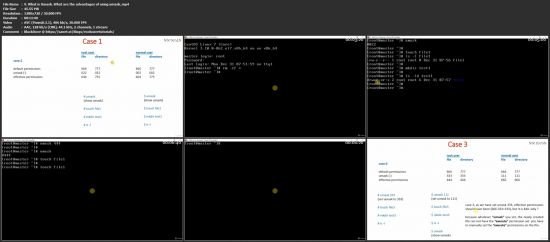Udemy - Linux Command Line For Beginners

https://TutSala.com
Genre: eLearning | MP4 | Video: h264, 1280x720 | Audio: AAC, 44.1 KHz
Language: English | Size: 2.33 GB | Duration: 8h 7m
This is an introductory course for using Linux command line. It is excellent course for Linux Beginners.
What you'll learn
How To install CentOS 7
Linux Command Line Basics
How To Create Files and Directories
What is Home Directory. Understanding Home Directory in Linux
Understad Linux Directory Structure. Various Directories and their Usage.
How to Create, Use and Remove Aliases in Linux
How to Remove Files and Directories as Normal and Root User
How to Copy Files and Directories in Linux
How to Move/Rename Files and Directories as Normal and Root User
How to Use in-built Help in Linux. Why using help is important.
Working with Different Wild Cards (*, ?, [ ]) in Linux
How to Use Vi (Vim) Editor in Linux. How to edit files in Linux
How to Use Linux History. Why it is very helpful
What is Default Shell. How to Change Shell in Linux
How To Change Linux Prompt
How To Use Soft Link, Hard Link and Inodes in Linux. Why these are useful
What is Login and Non-Login Shell. What are the Most Critical Files in Linux
How To Compress Using Gzip, Bzip2. Why To Use Gunzip, Bunzip2. Using Zip/Unzip
Using Tar For Backup and Restore. How to use tar with gzip,bzip2,gunzip,bunzip2
Local and Global Variables in Linux. How to Create and Use Variables.
How to Access CD/DVD/USB Drives in Linux
How To Manage Input(stdin) , Output(stdout) and Error(stderr) Streams in Linux.
Understanding Read, Write, Execute Permissions in Linux
How to Use User Permissions
Why and How to UseGroup Permissions
What is Umask. What are the advantages of using umask.
What do you mean by Symbolic vs Numeric Permissions in Linux
How to Perform User Management in Linux.
Why and How to Use Sudo. How to delegate tasks using Sudo
Why PATH Variable is Very Important. How To Use PATH Variable in Linux
Description
No one can afford to ignore Linux. The acceptance of Linux as a robust and dependable system is growing day by day. Big Corporations, Small Business Houses, Govt. Departments, Colleges, Universities are moving to Linux as their choice platform. Linux is future. It is the most flexible and Open Ended OS.
Linux Command Line Basics. How to Create Files & Directories. Understanding Home Directory. Understanding Directory Structure. How to create Aliases. How to Remove Files & Directories. How to copy Copy Files & Directories. How to Rename Files & Directories. How to Use Help. Working with Wildcards. How to use Vi/Vim Editor. How to Manage History. How to Change Shell. How to Change Prompt. How to Create Soft & Hard Links. What is Login, Non-Login Shell & various Critical Files. How to use Compression Utilities GZIP, BZIP2, ZIP. How to perform Backup/Restore using Tar. What are Local Global Variables. How to Access CD/DVD/USB Drives. What is Input Output Redirection. Understanding Read, Write, Execute Permissions. How to use User Permissions. How to use Group Permissions. What is Umask. Symbolic vs Numeric Permissions, How to perform User Management. How to Configure and use sudo.
This Course starts from basics & then takes you to some advance Linux concepts. The focus has been to make learning experience very simple & interesting. Everything has been explained by giving examples.
